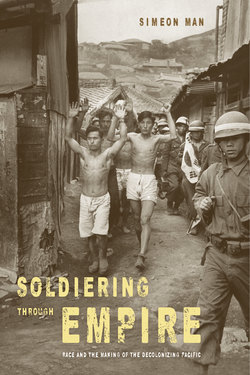Soldiering through Empire

Реклама. ООО «ЛитРес», ИНН: 7719571260.
Оглавление
Simeon Man. Soldiering through Empire
Отрывок из книги
Soldiering through Empire
Edited by Earl Lewis, George Lipsitz, George Sánchez, Dana Takagi, Laura Briggs, and Nikhil Pal Singh
.....
Despite all signs of Kuwaye’s “leftist inclination,” authorities did not pursue her case further due to a “lack of conclusive proof that subject was subversive,” but her case had sufficiently alarmed officials.58 Kuwaye’s associations with leftists in Hawai‘i, Japan, and Okinawa raised questions about the loyalty of Nisei subjects employed by the U.S. Army, and it illuminated the porous boundaries of the radicalizing Pacific. The agent assigned to her case had determined, “The damage inflicted by persons of this ilk upon the occupation effort is by no means limited to their activities while in this theater [the “Far East”]. As was recently demonstrated in another case, these people return to the United States as ‘experts’ on occupation policy and set about undermining Japanese policy to any group that will listen or read their leftist ‘exposé.’” In short, the military had become a vehicle for individual and collective radicalization to undermine the U.S. empire. “The solution to this situation,” the agent concluded, “appears to be more careful investigation prior to employment and more effective means for immediate removal of such persons from employment with the occupation.”59
It was precisely this fear of subversion within the U.S. Pacific empire, even in the absence of “conclusive proof” of it, that drove G-2 to locate and determine the loyalty of Asian subjects in the military. The line between “good” and “bad” Asians never had been easy to decipher, but it nonetheless became more and more important to demarcate as the United States pursued its global war against communism. Another report on Calvin Kim, for example, revealed that the Korean American officer who was ordered to the Military Intelligence Service Language School in 1945 because of his Korean-language ability was later found to have engaged in questionable political activities, including signing two petitions in 1948 to have the Independent Progressive Party placed on the California State ballot and for an equal-housing initiative, both of which were “circulated by a known CP member.” In 1952, the army conducted a polygraph on Kim to determine his political affiliations, and the agent concluded, “There is no information to indicate that Kim has ever embraced foreign ideologies or that his racial background makes him vulnerable to Communist propaganda.” As for Kim’s earlier political involvements, “[h]e was apparently duped by the IPP in 1948, as were many politically naïve people.”60
.....